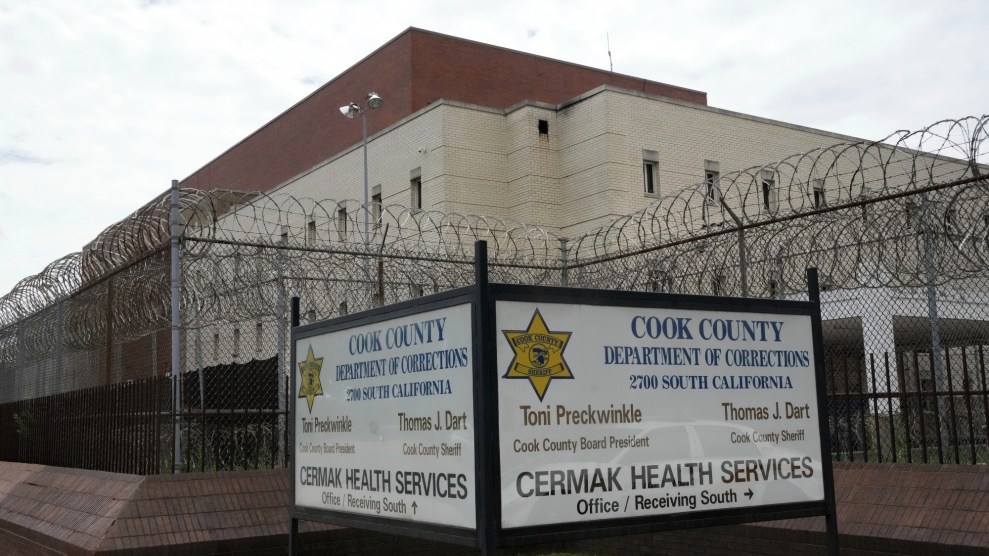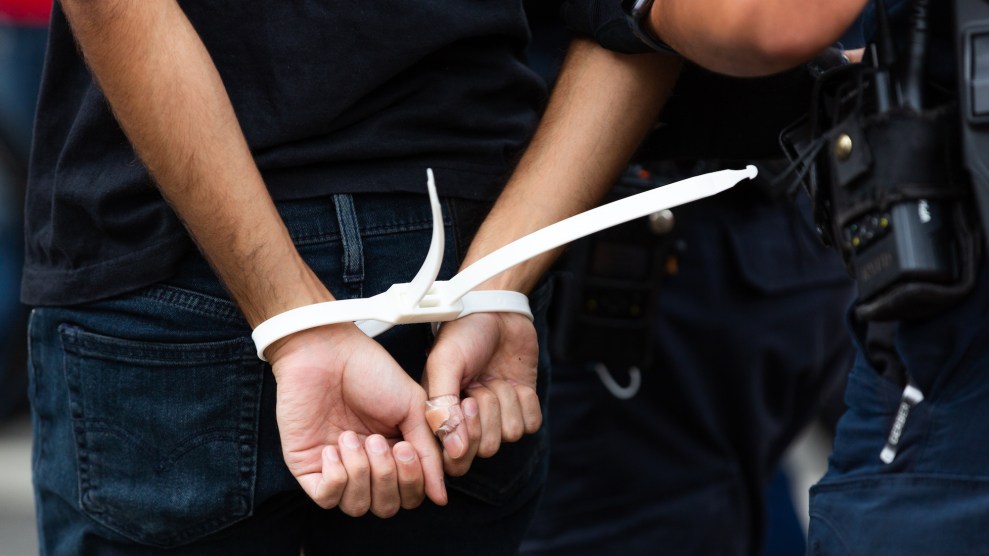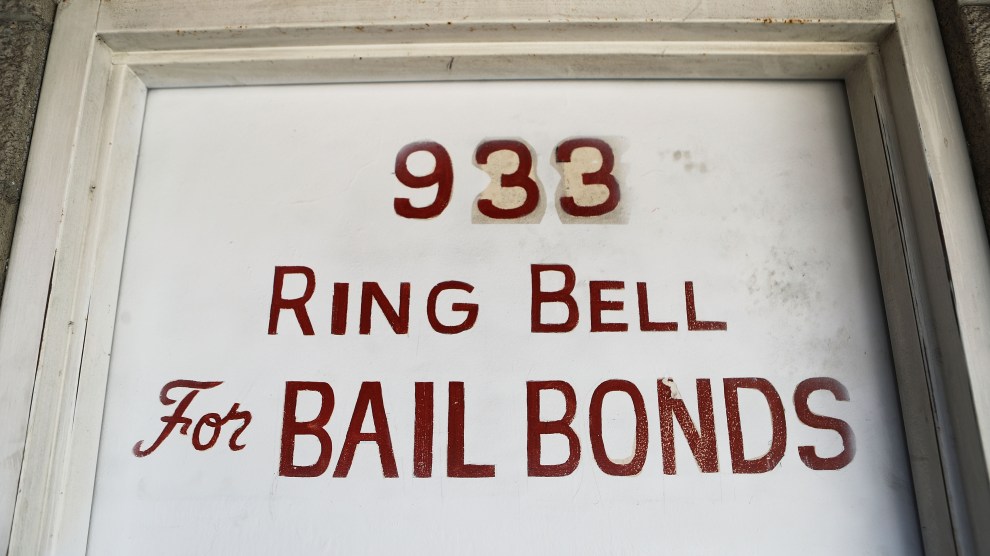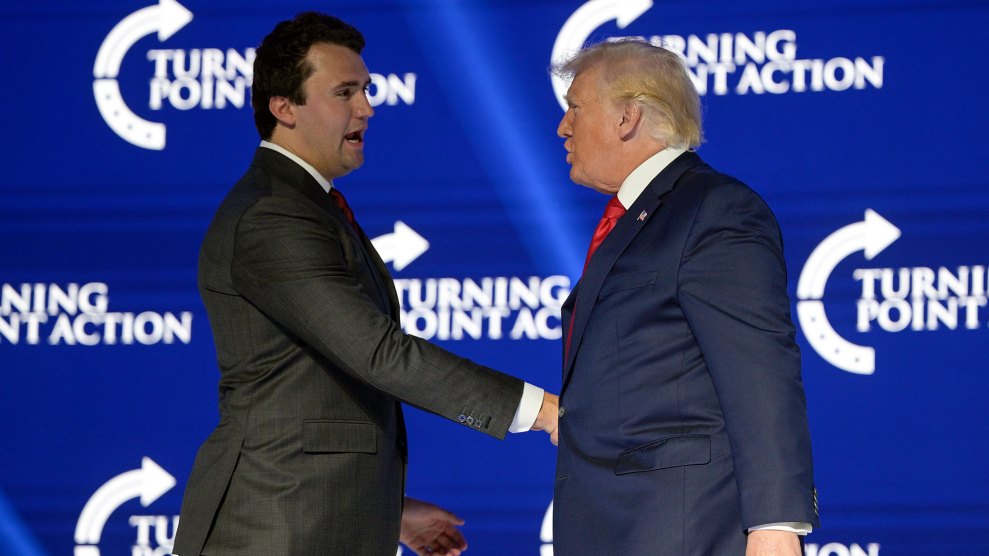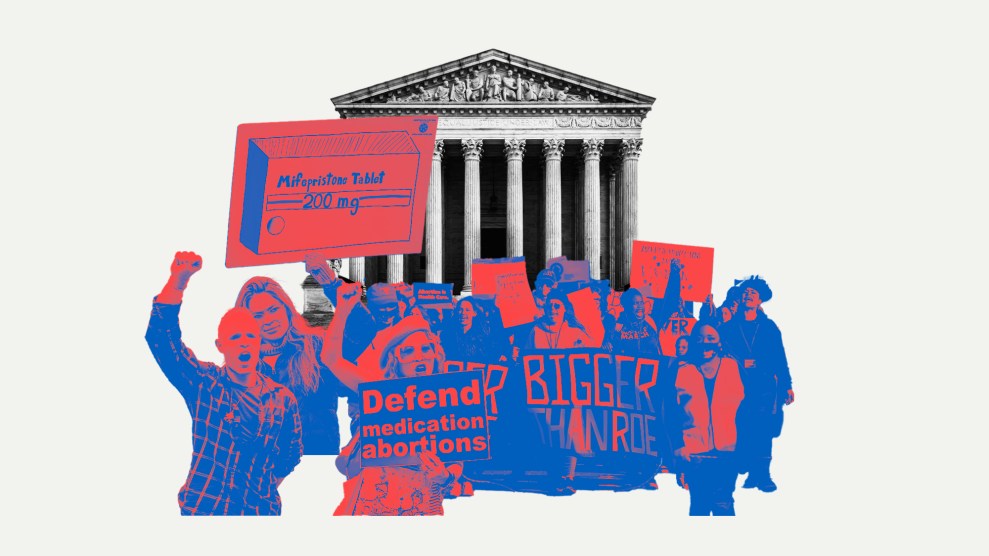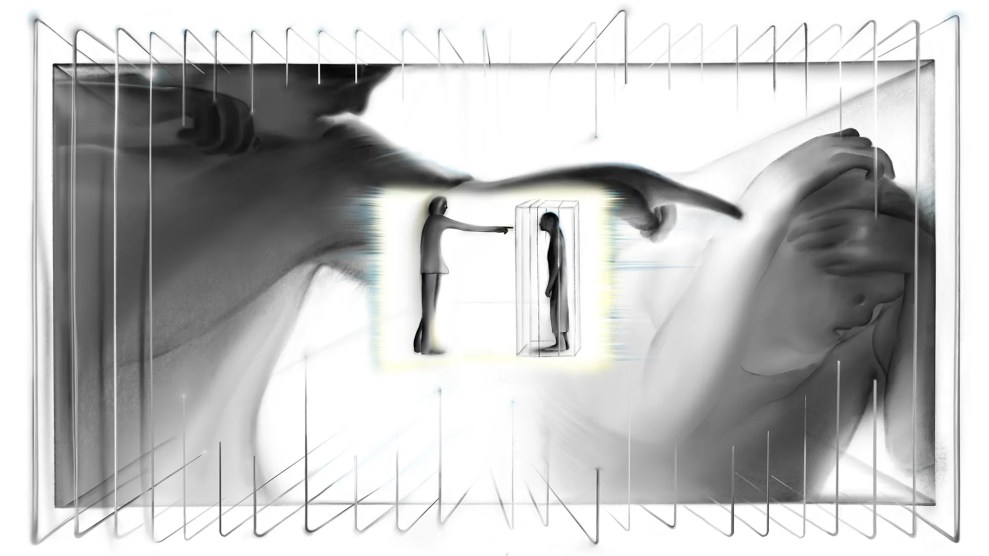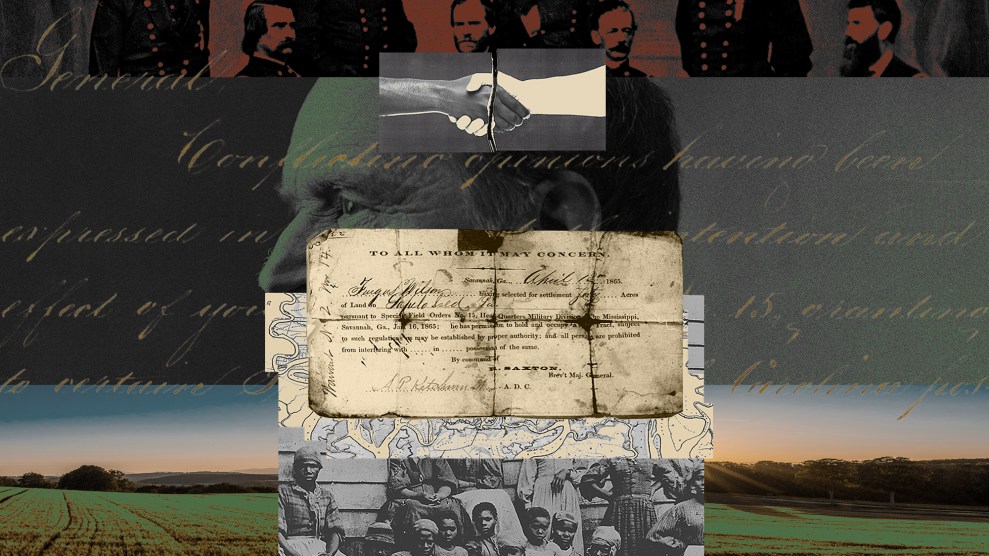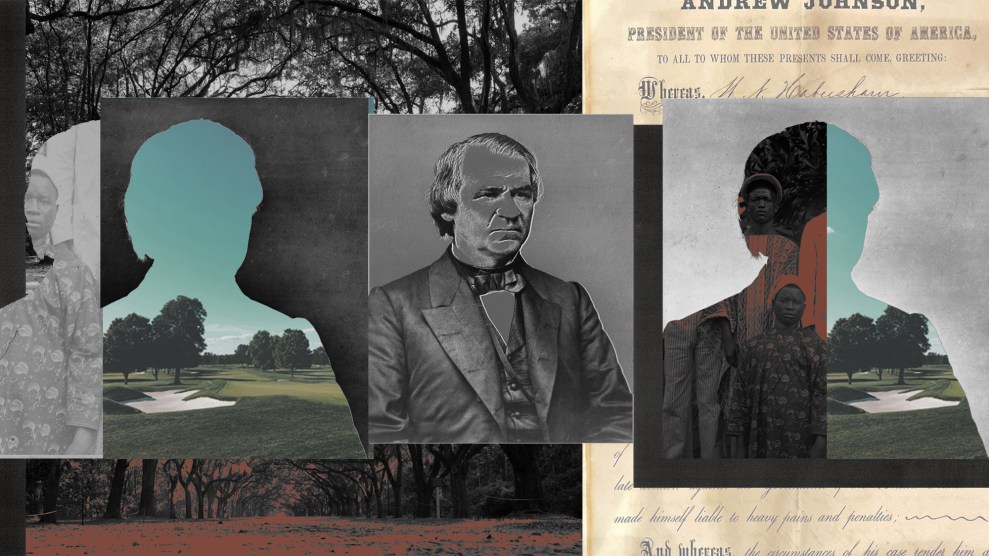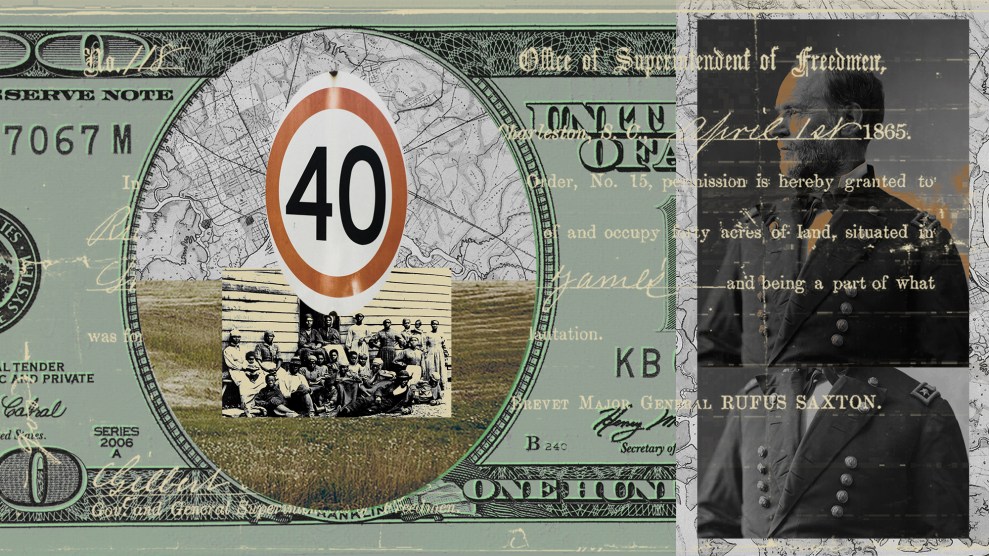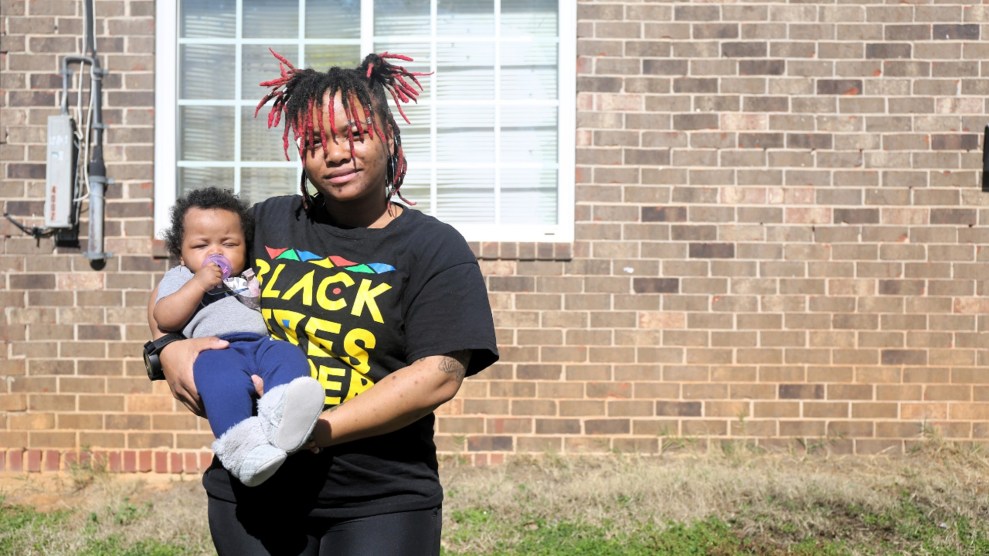
Nia Thomas, a beneficiary of a national campaign to bail out Black mothers, with her daughter, Nilah, in front of their Atlanta home.R.J. Rico/AP
In early May, Georgia lawmakers celebrated the passage of the state’s latest weapon to criminalize protest: making bail unpayable.
Community bail funds, which have served as an important mutual aid strategy for Black communities and racial justice activists, are now functionally illegal in Georgia. The new law expands the cash bail system by making close to 30 offenses, including protest-related charges like unlawful assembly, bail ineligible. It also makes obtaining bail through anyone other than for-profit bond agents, who turn a profit by extracting hefty fines and fees from desperate clients, almost impossible. As of July 1, anyone —be it a mother, uncle, church, or nonprofit—who tries to bail more than three people out a year will risk being charged with a misdemeanor.
Gov. Brian Kemp claims the law gives the courts “tougher tools to bring violent offenders to justice,” but legal advocates see a different, more sinister motivation.
“This bill is one part of a larger crackdown on protest,” says Cory Isaacson, legal director at the ACLU of Georgia. “We want people to be able to protest actions from the government without fear that there will be retribution, but unfortunately that’s exactly what we’re seeing in this state.”
Retribution certainly seems to be the order of the day in Georgia politics. The state’s attack on community bail funds is a collaboration between some of the most reactionary forces in local politics. Drafted by aggrieved private bail companies eager to neutralize a threat to their $2 billion dollar bottom line and promoted by the American Legislative Exchange Committee (ALEC), a right wing think tank, the bill is a perfect vehicle for GOP lawmakers to champion law and order policies while expanding a highly profitable bail system that has been abandoned by nearly every nation in the world except the US and the Philippines.
It also serves a top priority in the Georgia legislature: suppressing political participation. The bail fund law will go into effect almost exactly a year after Georgia police raided the offices of the Atlanta Solidarity Fund, a nonprofit that provides bail and legal aid to people arrested at protests, and arrested three people for money laundering and charity fraud. For the last few years, the fund has been a key support system for activists protesting the construction of a $90 million police training facility known locally as “Cop City.”
In addition to harboring “extremist anti-government and anti-establishment views,” prosecutors argued the group funneled money towards illegal protests by purchasing things like signs, camping gear, and gas. They also accused them of vandalizing Ebenezer Baptist Church, a historic Black church based in Atlanta and led by Martin Luther King Jr. until his assassination in 1968.
The bail fund leaders are currently awaiting trial, but the presiding judge seems skeptical.
“I don’t find it real impressive,” said Judge James Altman. “There’s not a lot of meat on the bones of thousands of dollars going to illegal activities.” This skepticism, however, has done little to moderate the actions of Georgia Attorney General Chris Carr, who included the bail fund leaders in a sweeping RICO indictment of Stop Cop City demonstrators last September. The ACLU said the charges could “form a playbook for other prosecutors and state officials seeking to stifle political dissent.”
Yet, for all the state’s anti-protest efforts, community bail funds do not exclusively support activists. More than 400,000 people are stuck in jail because they can’t afford to leave. That’s nearly 70 percent of the jail population. None have been convicted of a crime. Nia Thomas was one of them. After dodging an eviction notice in August 2021 with the help of her cousin, the then mother of three found herself in a tight spot.
“He asked me to do him a favor,” she told me. “He needed me to go somewhere and see this guy. I didn’t know what I was going to be doing, but I went and the guy put bags in my trunk.”
That favor landed her in Bartow County Jail in September facing gun and drug trafficking charges. Even though this was Thomas’ first serious offense, the judge set bail at $100,000. She spent eight months in jail unable to pay her bail and lost custody of her children in the process. In March, the judge reduced her bail to $50,000. Three months later, it was paid by Barred Business, a local nonprofit and bail fund Thomas heard about through her roommate.
“I didn’t think it was real. I was so shocked and overjoyed. I was crying, my mom was crying, everyone in the jail cell was like “hurry up and get your stuff before they change their mind!’”
Because of Barred Business, she was home to hug her children by Mother’s Day. The support went far beyond the cash she needed for bail. “They make sure you have a place to live,” she told me. “They help you with food stamps, Medicaid, Obamacare, anything you need. When I was having my baby, they made sure I had formula, clothes, and a car seat. It’s not just bonding people out, they really help.”
Thomas is one of over 700 mothers to be bailed out as a part of the Black Mama’s Bail Out, a national grassroots effort coordinated by National Bail Out, a coalition dedicated to ending mass incarceration. Since 2017, the group has convened dozens of local bail funds around the country to free Black mothers and caregivers for Mother’s Day. While they and their partners do not restrict their funds based on a person’s charges or bail amount, they have noticed a clear pattern in their work.
“Many of the charges our folks are facing have to do with traffic violations,” says Yabsera Faris, director of communications at National Bail Out. “Things like not wearing a seatbelt, broken tail lights, and failure to purchase insurance. Black women are so targeted by these violations that one of our partner orgs is hosting free events to fix people’s tail lights.”
On Mother’s Day, with 18 partners in 15 states, Bail Out organizers played offense and defense, helping local funds bail people out while navigating the implementation of laws that will soon make their work illegal.
“We have organizations in our coalition in Georgia, New York, Florida, Missouri, Oklahoma and Texas that are all facing legislation that will criminalize community bail funds or limit the charges that people can get bailed out for,” says Faris. “This year we intentionally decided to include three organizations in Georgia because it might be the last time we’re able to bail out more than three folks in a year.”
One of those groups is Barred Business, the same nonprofit that paid Nia Thomas’ bail. On Mother’s Day, they bailed out mothers in the Atlanta area supported by members of the historic Ebenezer Baptist Church. Since 2018, the congregation has conducted Freedom Day bailouts on Juneteenth, a tradition started by Ebenezer pastor and current Georgia Senator Raphael Warnock, who just a few months ago petitioned the Department of Justice to prioritize its investigation into Fulton County Jail in Atlanta, where 10 people have died awaiting trial since 2023. This year, his congregants at Ebenezer are spearheading local bail outs while mobilizing a coalition of more than 100 faith groups to resist Georgia’s bail fund law.
“If the faith community remains muted on this matter, I believe that the judgment of God is truly upon us,” says Reverend Devon Crawford, the national executive director of Ebenezer’s Multi-faith Initiative to End Mass Incarceration. “If we are going to be a beloved community that recognizes the sacred value of all, we cannot continue to invest in incarceration.”
In addition to organizing bail outs in May and June, the church launched a campaign called “I Got Three” in response to Georgia’s new requirement barring an individual or group from bailing more than three people out a year. “Our hope is to deepen the coalition of faith communities and individuals that are willing to invest in charitable bail funds that currently exist. We want more resources to support more people,” says Crawford.
While churches and nonprofits prepare to conduct bailouts in hostile states, legal experts are preparing to defend their work in the courts. “We see a clear first amendment violation,” says Cory Isaacson at the ACLU of Georgia. “In posting bail, churches and nonprofits are expressing their position that it is immoral that people are languishing in jail because of their poverty. It’s a form of expressive conduct protected under the first amendment.”
This legal argument, which protects activities like flag burning and feeding the homeless, will likely make its way to court this summer, when the ACLU of Georgia plans to sue in response to the state’s bail fund law. But in the meantime, Georgia residents will continue to build a case for bailouts as democratic speech.
“Posting bail for neighbors is a form of democratic participation,” says Jocelyn Simonson, a professor at Brooklyn Law School. “It’s one of the moments in the criminal system in which we allow the community to come in and have a say in what’s happening. To put limits on it or outlaw it is to criminalize democratic participation.”
That commitment to democracy has kept local leaders united even as Georgia officials attempt to sow discord. When asked about state prosecutors’ claim that Atlanta Solidarity Fund leaders vandalized Ebenezer Baptist Church, Reverend Crawford pointed towards the shared history that binds racial justice activists together.
“There is a rich legacy of dissent and protest in Atlanta,” Crawford told me. “Any attempt to really silence and intimidate that imperils our strength as a democracy.”

